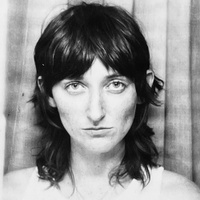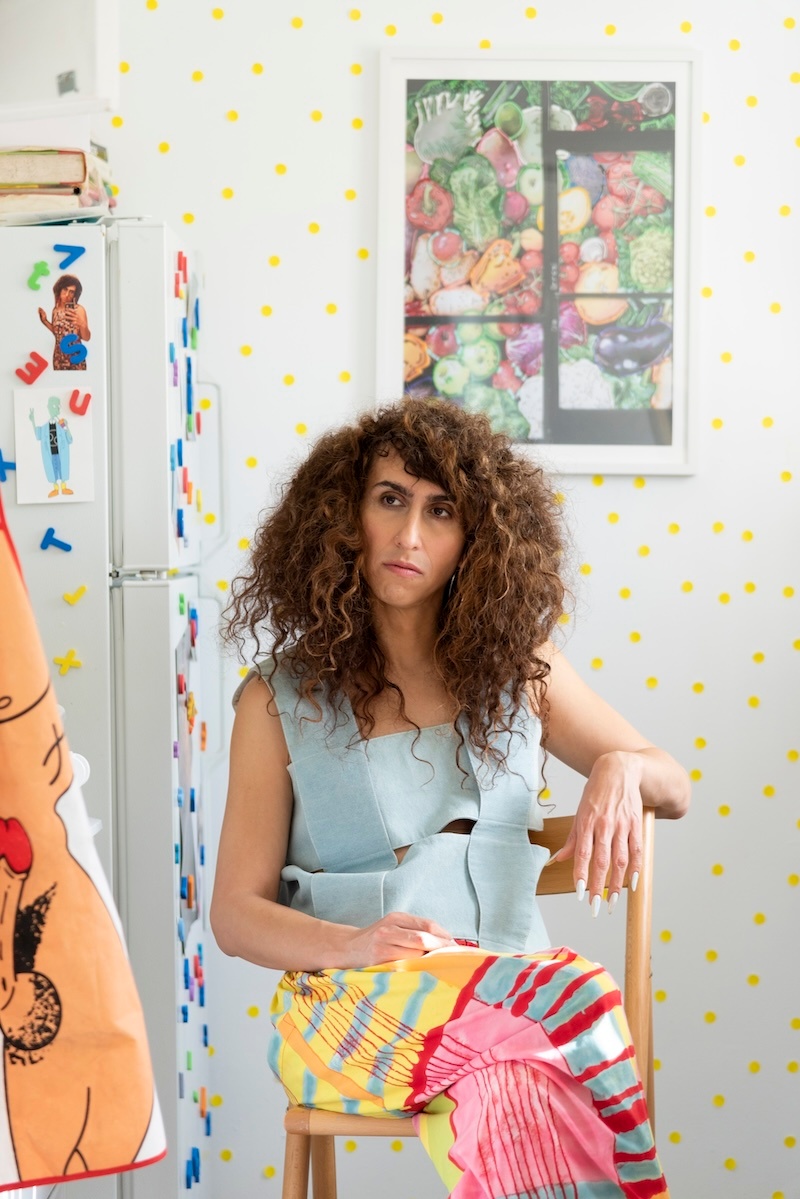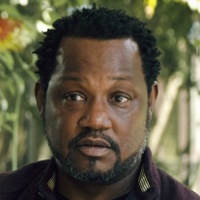On not taking yourself too seriously
Photographer and new media artist Olivia Alonso Gough, aka @bug_girl_69, discusses working with different tiers of creativity, establishing a routine, and not going to grad school unless it's free.You’ve said in the past that creativity doesn’t come easily to you. I was wondering if you could expand on that?
I feel like I hear so many creatives talking about this restlessness, “I must always be making something.” I’ve always been so envious of that, because sometimes my creativity feels like pulling teeth. I know I’m unhappy when I’m not making stuff, but that doesn’t mean that I spring out of bed like, “I have a new idea!” It’s really hard. The whole process is hard. And then when I’m done, it’s still hard, and I don’t feel like, “a-ha!” at the end of it either. While it’s necessary for me and my brain and my well-being, it feels more like exercise. I’ve never liked exercising. I never want to go for a run, but I know I feel better when I do.
They say creativity is a muscle that you have to work sometimes.
And I’m a weakling.
Where does humor come into play? There’s a big element of humor in your work. Although, your portraits come across as very stoic and serious.
I think I’ve always felt that art must be serious, and that’s not true. That was stopping me a lot because I’m not a serious person, and I’m incapable of taking myself too seriously. Part of why grad school destroyed me is because I was like, “I can’t make something funny. I must talk about Walter Benjamin.” That sucked because that’s not how my brain works. As much as I love to read theory, I’m never going to make work that is super high concept. Like referencing all these art geniuses. That’s not me.
I feel like grad school was training us to become “professionals” rather than “artists,” even though everyone’s always talking about getting in touch with your inner child. The atmosphere doesn’t encourage it.
It doesn’t encourage it at all. I so badly wanted to be that type of artist. For two years, I tried to make work that I would never make. If you look at my images from that time, they’re so… I just got so navel-gazey and was trying to use big words that I had no business using, because I didn’t quite understand what I was saying. But I was like, “I want to be taken seriously, so I must be serious.”
The portraits I’ve been working on the past few years, while the subjects are often stoic, they’re really playful because they almost function as “I Spy.” They’re environmental portraits, so they’re surrounded by their things. You’re trying to learn more about these people. You’re snooping around. You’re trying to piece together information about them based off of the little knick knacks behind them. Once I acknowledged [the photos] could be playful, it got a lot easier to shoot them.
And then I think the rest of my art practice is just straight up funny.
Like what?
When I did Bug World, which is a 3-D virtual art space, that was the first time that I allowed [myself] to take something kind of funny, seriously. It’s kind of a ridiculous gesture to make a whole virtual world for your meme page. It was really liberating in that I didn’t overthink it. I was just like, “I’m going to make this because I think it’s cool,” and that’s it. I’m not going to try to go to the library and pull out 600 books and find something smart that resonates and then apply it to that.
Bug World feels like one of the bigger projects where there is a pretty clear intersection between the identities of @bug_girl_69 and Olivia Alonso Gough. How do you think about the art audience and the non-art audience?
People are on a meme page to look at memes. They’re not on a meme page to discover new artists. But I was like, if I can make a gesture so ridiculous that it almost reads as a meme, perhaps then I can re-route some of those people’s attention to art I love. I thought, @bug_girl_69 is a place of play and humor, and so I should extend that into the visuals of [Bug World].
I was thinking a lot about how I’ve always felt such discomfort in the art world. Not everybody does this, but there’s so many times that I feel like the wall text [in museums] is trying to make people feel stupid. It’s so disrespectful to assume that your audience is dumb. It’s so disrespectful to assume that masses aren’t interested in consuming art. Art can be so snobby.
And I was like, well, this is a cool and fun opportunity to make something that doesn’t feel snobby, that can be engaging to anyone, not just someone with an MFA. I don’t say that to say someone with an MFA is smarter and has a deeper understanding. I just think that someone with an MFA has been taught how to decipher this code art language that isn’t helpful to anybody. The point of art is to communicate, not to make people feel left out. When you’re using this crazy, intricate language of art English, it feels like a “keep out” sign.
When I picture who is looking at my work, I don’t have a clear image of who that is, because I feel lucky in that I think my audience has become really diverse. I did use cartoony fun things because I think play is a good access point, but it’s not that I’m doing that to dumb things down, because I think anybody can understand anything.
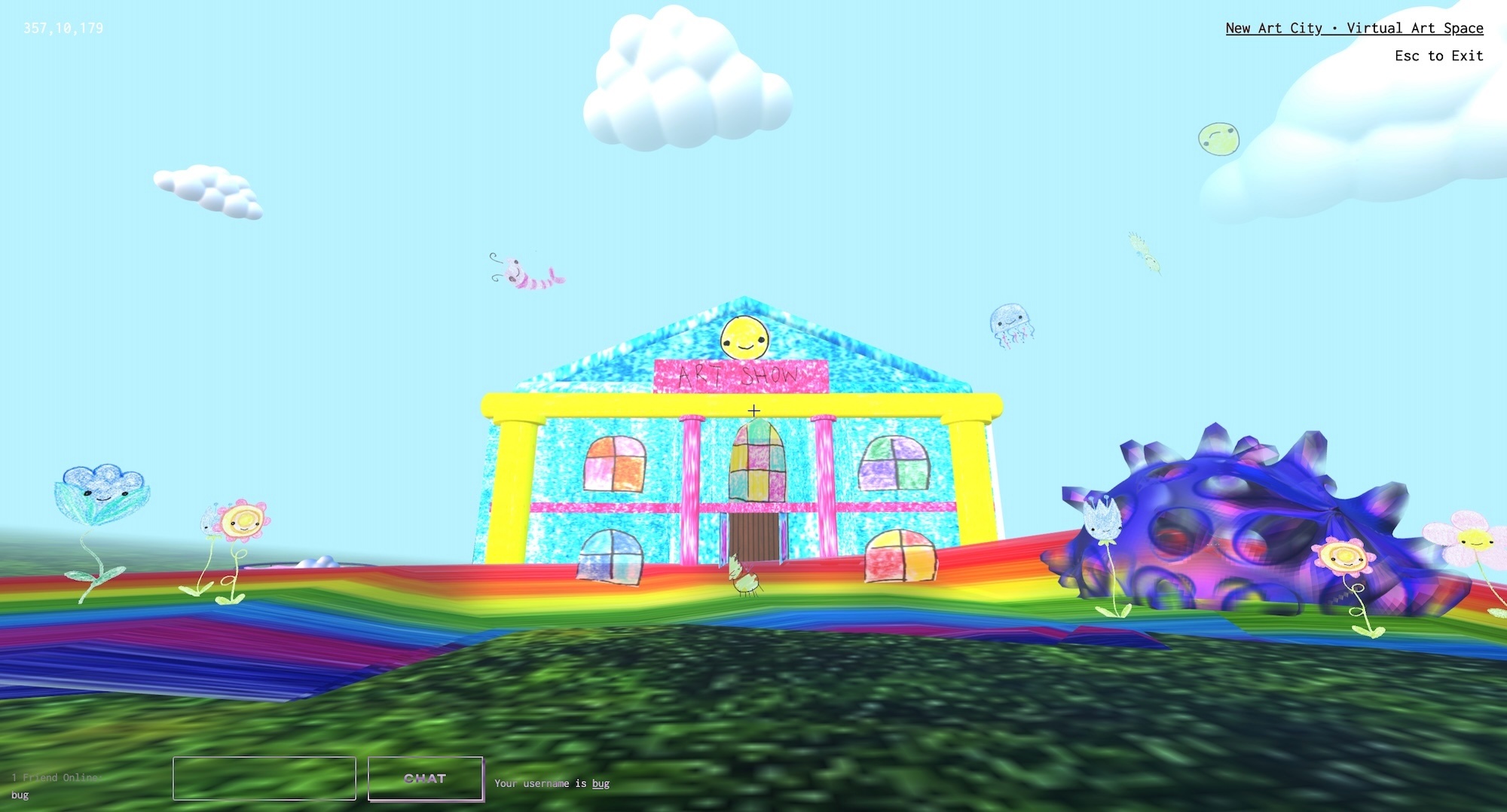
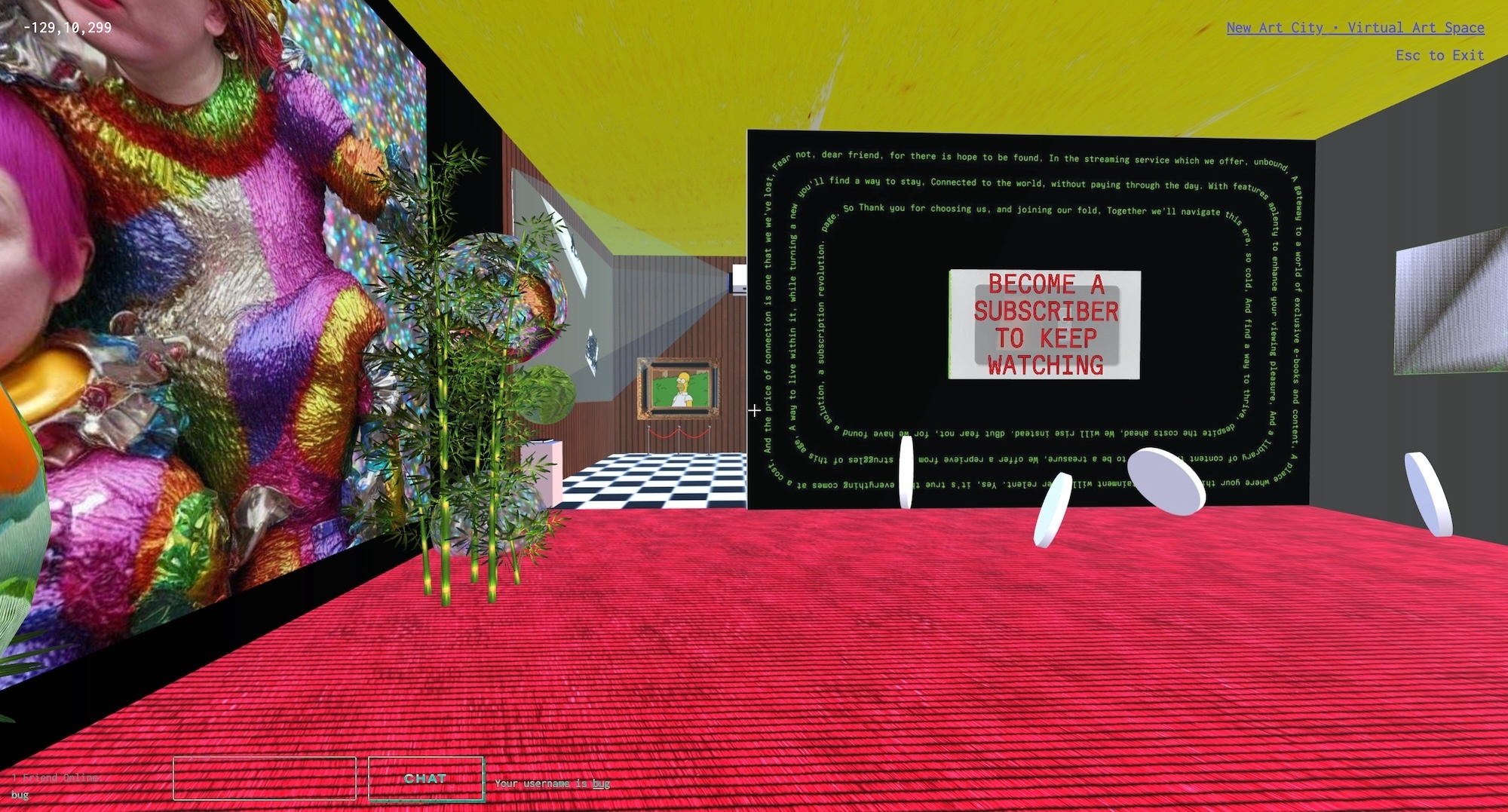 from Bug World
from Bug World
Speaking of play and playful things, and because we’ve known each other for a very long time now, what advice or wisdom would you give a younger you?
To stop trying to be a type of smart that I’m not. There is nothing worse than someone trying to sound smart. Just because I can’t talk like museum wall text doesn’t mean I’m an idiot.
I felt like for all of grad school, I was like, “Oh, I don’t understand what these people are saying. I must be fucking stupid.” Then I realized, so many of these people aren’t saying anything. They’re creating an intricate trap with the language so you can’t ask questions about their work, so you can’t prod holes into it. I think it’s cowardly to rely on people not understanding your work, to get away with it kind of being bad and boring. Obviously, there’s so much work I adore that is really well-spoken about and really heavy and complicated, so I’m not speaking about all of it that way. But I did encounter that a lot in grad school, and I wish I had realized that [at the time].
I had this class where you had weekly readings and everybody had to read them, but a different student had to report on it to the class. I had a week to prepare [mine]. It was maybe 10 pages of reading. I spent five to six hours every single day of that week reading and rereading this. And I was like, “I’m so stupid. I’m so stupid. I don’t understand it. I shouldn’t be here. I shouldn’t be in this school. I don’t understand this language.”
I get to class that day in a panic attack, crying, and my teacher’s like, “what’s wrong?” She thought somebody died. And I was like, “I didn’t do the reading.” And she’s like, “Oh, it’s not a big deal.” And then when she opened it up to the class, everybody was just like, “Oh, yeah, this was really poorly written, and it didn’t make sense.” I didn’t, for a second, think that maybe it was poorly written. I just assumed I’m too stupid to understand this.
Well, it’s presented to you in an institutional setting. It’s presented in a way where you’re supposed to think it’s important because why else would you be reading it?
Exactly. I read this one reading that was, I thought, amazing. It was a George Orwell thing, I don’t think he talks about the art world in it, but he talks about how bureaucratic language is used kind of violently to keep people away. It’s so fucking hard to get your health insurance. It’s so fucking hard to deal with legal systems. And that’s intentional. It can be the same in the art world.
Do you feel like [grad school] was worth it?
Fuck no. I think it’s psychotic that our institutions can get away with charging as much as they do for knowing that the vast majority of their students are never going to be employed in that field. And it’s obviously because of this, that MFA programs are so, or can be so… I mean, they’re such a place of privilege. So many people are doing it because it’s like, a thing to do. I don’t know. I think it’s kind of criminal.
Also, to be fair, I didn’t take the best advantage of grad school. I was so depressed. And grad school was one of the reasons I was depressed. There were also other reasons, and I think I was really caught up and I was really in my own head, and I am glad I did it. But anytime somebody has asked me if they should go to grad school since then, I give the advice I didn’t take, which is don’t go unless it’s free.
Even though that’s how you feel about grad school now, do you feel like there are skills you learned that you use on a regular basis? Are there any positive things that came out of it?
Going to grad school made me understand the problems I have with academia as a system, and it made me realize how important I think accessibility is. All of the things I thought I was going to learn, I didn’t. But I think it was really helpful to learn by living it. I thought, if I do this, I will be a real artist. And it’s like, oh, [I was] a real artist before. I don’t think I would’ve realized that. I think I would’ve always looked at somebody with an MFA as being smarter or a better artist than me. Now I’m just like, that’s not true. Some of the biggest idiots I’ve ever met have MFAs.
Because you have the meme page, Bug World, and your photo work, do you feel like you need various creative outlets in order to not feel stuck creatively?
Yes, one hundred percent. The way that I’ve been thinking about it for the past few years is, I have three tiers of creativity. And I always must have at least one thing going on in each one.
Tier One is the stuff that is vaguely creative that I barely think about, and it’s often what I make the most money off of. So it’s like social media work, boring editorial shoots—a creative type thing that can be done within a few hours. That’s actually what sustains me financially. Tier Two is like music videos and the earring project, where it takes more time, but I’m not washing it over my brain a thousand times. I have two weeks to think about it, make it, and put it out.
Tier Three is what I really consider my art practice. That would be my photo book that I’ve been working on for two or three years. The video game I’m working on that I’ve also been working on for three years, or Bug World, that took a massive amount of time. These are things I never make money off of.
Those are like the “passion projects.”
Exactly, they’re the passion projects that I don’t make money off of, but they’re the ones that ultimately bring me the most satisfaction and joy. But if I were to only have those things going on, because they’re so slow moving, I would feel insane. I need to have these smaller, shorter-term projects that I’m not viewing and reviewing a thousand times, because otherwise I’d just feel stuck. I think about these different types of creative outputs and how having the ones that are “not as smart” or “not as good,” whatever that means, are actually the ones that are really my saving grace.
To think conceptually all the time takes a lot of effort.
It’s exhausting. While I don’t make work for it to be validated by people, obviously, your artwork being received, does in some way, keep you going. You need that for any kind of success. But if you’re working on a three-year project, and you haven’t received validation on it, because nobody knows about it, it kind of feels like, “oh my god, I’ve been working for three years on this thing and I don’t even know what’s going to happen to it.”
You don’t want to put all your eggs in one basket. People use that [term] when they’re talking about money, but I feel like it does apply to your own imagination or creative fulfillment.
The other thing is, those passion projects take so much time and so much money, and sometimes you do have to stop for six months.
Because life just happens and there are other things.
Yeah, I don’t have time to set aside several hours a week to shoot images that I lose money on because I have $17 in my bank account. I have to work. So yeah, I’m going to put a pause on that. But if you have to put a pause on it, it’s easy to feel like, “oh my god, I haven’t made anything in so long.” Then once you stop making things for a long time, it’s even harder to start again. If you have shorter-term projects happening, it’s harder to fall into that rut.
Being in your thirties now, and having experienced the feeling of stopping and having a hard time starting again, so many times, do you trust the fact that ideas will come again?
No, I always live in fear that I’m never going to have another idea. I am scared that one day my brain will just be empty and that’s it. I’m never going to make anything. I have evidence that that’s not true, but I have a really hard time convincing myself otherwise. It does feel like creativity can be finite.
What do you do when you get stuck? When you hit that wall where you feel like you’re never going to have another idea again?
I just eventually have another idea. You consume more work. You continue to live life and stuff comes to you. Obviously, looking at other art, but it’s just, yeah, it’s obviously going to come back. I definitely think that having a steady routine is huge.
Olivia Alonso Gough recommends:
Written on The Body by Jeanette Winterson. My favorite book, I don’t really remember much about it but I remember it feeling huge when I initially read it 10 years ago, and I recommend it all the time. Let me know if it holds up.
New Art City. Make yourself a virtual world, why not. New Art City makes it so easy and it’s a much more exciting way of existing online than instagram and other flattened platforms.
Seasonal Bucket Lists. I only ever do anything if I put it on a list somewhere and recently stopped limiting myself to a weekly to-do list. Last summer I put stuff on there like “have a water balloon fight”, “shoot a music video”, “get abs”, and “catch a lizard”. It’s a fun way of setting goals that aren’t centered on productivity. (I did not get abs or catch a lizard, even though I tried really hard to catch a lizard).
Faccia Brutto Alpino Amaro. Good stuff, makes me feel way fancier than drinking a piss warm Tecate.
Sudoku. Get the little books at CVS instead of doing it on your phone. Writing numbers down and erasing them makes you feel like a genius. You can massage your temple with the eraser while you’re thinking really hard to look extra smart.
Pau (2021) from Eat With Your Entire Mouth

